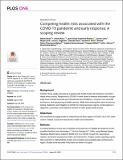Files in this item
Competing health risks associated with the COVID-19 pandemic and early response : a scoping review
Item metadata
| dc.contributor.author | Baral, Stefan | |
| dc.contributor.author | Rao, Amrita | |
| dc.contributor.author | Rwema, Jean Olivier Twahirwa | |
| dc.contributor.author | Lyons, Carrie | |
| dc.contributor.author | Cevik, Muge | |
| dc.contributor.author | Kågesten, Anna E. | |
| dc.contributor.author | Diouf, Daouda | |
| dc.contributor.author | Sohn, Annette H. | |
| dc.contributor.author | Phaswana-Mafuya, Refilwe Nancy | |
| dc.contributor.author | Kamarulzaman, Adeeba | |
| dc.contributor.author | Millett, Gregorio | |
| dc.contributor.author | Marcus, Julia L. | |
| dc.contributor.author | Mishra, Sharmistha | |
| dc.contributor.editor | Sallam, Malik | |
| dc.date.accessioned | 2022-08-31T10:30:08Z | |
| dc.date.available | 2022-08-31T10:30:08Z | |
| dc.date.issued | 2022-08-29 | |
| dc.identifier | 281109206 | |
| dc.identifier | 8ea6b2a3-51d8-4673-85b0-f6ed4745e29c | |
| dc.identifier | 85136858609 | |
| dc.identifier.citation | Baral , S , Rao , A , Rwema , J O T , Lyons , C , Cevik , M , Kågesten , A E , Diouf , D , Sohn , A H , Phaswana-Mafuya , R N , Kamarulzaman , A , Millett , G , Marcus , J L , Mishra , S & Sallam , M (ed.) 2022 , ' Competing health risks associated with the COVID-19 pandemic and early response : a scoping review ' , PLoS ONE , vol. 17 , no. 8 , e0273389 . https://doi.org/10.1371/journal.pone.0273389 | en |
| dc.identifier.issn | 1932-6203 | |
| dc.identifier.other | Jisc: 568682 | |
| dc.identifier.other | publisher-id: pone-d-21-08875 | |
| dc.identifier.uri | https://hdl.handle.net/10023/25921 | |
| dc.description | Funding: Amrita Rao is supported in part by the National Institute of Mental Health [F31MH124458]. Carrie Lyons is supported by the National Institute of Mental Health [F31MH128079] and by the National Institute of Allergy and Infectious Diseases Johns Hopkins HIV Epidemiology and Prevention Sciences Training Program [T32AI102623-08]. Julia Marcus is supported in part by the National Institute of Allergy and Infectious Diseases [K01AI122853]. Sharmistha Mishra is supported by a Tier 2 Canada Research Chair in Mathematical Modeling. Refilwe Nancy Phaswana-Mafuya is supported by the South African Medical Research Council. | en |
| dc.description.abstract | Background : COVID-19 has rapidly emerged as a global public health threat with infections recorded in nearly every country. Responses to COVID-19 have varied in intensity and breadth, but generally have included domestic and international travel limitations, closure of non-essential businesses, and repurposing of health services. While these interventions have focused on testing, treatment, and mitigation of COVID-19, there have been reports of interruptions to diagnostic, prevention, and treatment services for other public health threats. Objectives : We conducted a scoping review to characterize the early impact of COVID-19 on HIV, tuberculosis, malaria, sexual and reproductive health, and malnutrition. Methods : A scoping literature review was completed using searches of PubMed and preprint servers (medRxiv/bioRxiv) from November 1st, 2019 to October 31st, 2020, using Medical Subject Headings (MeSH) terms related to SARS-CoV-2 or COVID-19 and HIV, tuberculosis, malaria, sexual and reproductive health, and malnutrition. Empiric studies reporting original data collection or mathematical models were included, and available data synthesized by region. Studies were excluded if they were not written in English. Results : A total of 1604 published papers and 205 preprints were retrieved in the search. Overall, 8.0% (129/1604) of published studies and 10.2% (21/205) of preprints met the inclusion criteria and were included in this review: 7.3% (68/931) on HIV, 7.1% (24/339) on tuberculosis, 11.6% (26/224) on malaria, 7.8% (19/183) on sexual and reproductive health, and 9.8% (13/132) on malnutrition. Thematic results were similar across competing health risks, with substantial indirect effects of the COVID-19 pandemic and response on diagnostic, prevention, and treatment services for HIV, tuberculosis, malaria, sexual and reproductive health, and malnutrition. Discussion : COVID-19 emerged in the context of existing public health threats that result in millions of deaths every year. Thus, effectively responding to COVID-19 while minimizing the negative impacts of COVID-19 necessitates innovation and integration of existing programs that are often siloed across health systems. Inequities have been a consistent driver of existing health threats; COVID-19 has worsened disparities, reinforcing the need for programs that address structural risks. The data reviewed here suggest that effective strengthening of health systems should include investment and planning focused on ensuring the continuity of care for both rapidly emergent and existing public health threats. | |
| dc.format.extent | 21 | |
| dc.format.extent | 587423 | |
| dc.language.iso | eng | |
| dc.relation.ispartof | PLoS ONE | en |
| dc.subject | RA0421 Public health. Hygiene. Preventive Medicine | en |
| dc.subject | SDG 2 - Zero Hunger | en |
| dc.subject | SDG 3 - Good Health and Well-being | en |
| dc.subject.lcc | RA0421 | en |
| dc.title | Competing health risks associated with the COVID-19 pandemic and early response : a scoping review | en |
| dc.type | Journal item | en |
| dc.contributor.institution | University of St Andrews. School of Medicine | en |
| dc.contributor.institution | University of St Andrews. Infection and Global Health Division | en |
| dc.identifier.doi | 10.1371/journal.pone.0273389 | |
| dc.description.status | Peer reviewed | en |
This item appears in the following Collection(s)
Items in the St Andrews Research Repository are protected by copyright, with all rights reserved, unless otherwise indicated.

